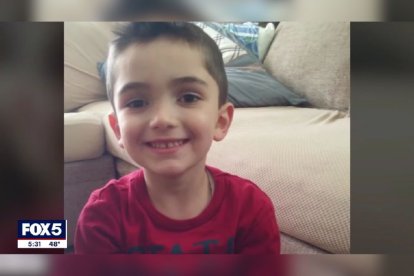New York grand jury report: Child Protective Services failed to protect Thomas Valva from father's murder
The scathing document points out that the CPS agency and its controversial rules are related to the death of the 8-year-old boy, who suffered systematic abuse in his home.

Thomas Valva. (Fox 5, captura)
A New York grand jury shed light on the responsibility of Child Protective Services (CPS) in the bloody case of Thomas Valva, which at the time represented a severe blow to the citizens of New York and garnered national attention.
The 8-year-old boy died on January 17, 2020, in the garage of his home on Long Island. He suffered systemic abuse from his father, a former police officer with the New York Police Department, Michael Valva, and his partner, Angela Pollina. They left Thomas and his brother locked in the garage on a cold winter night.
Thomas, who had allegedly wet his bed, was punished by his father with a cold water bath from a hose while the boy lay against the cold cement floor. The autopsy was clear: Thomas died starving and frozen because of that abuse.
Michael Valva was eventually convicted of Thomas' murder with 25 years to life in prison. Pollina was also found guilty of second-degree murder of the child and received the same punishment since she did not intercede to prevent the death of her husband's son.
However, although the crime against Thomas Valva did not go unpunished, More than four years after his murder, there was still something unresolved: Child Protective Services' responsibility in the matter.
If CPS agencies acted, Thomas Valva would be alive
The revelations about the abuse suffered by Thomas Valva, with the chilling details recounted by his teachers, led Ray Tierney, Suffolk County District Attorney, to assemble a grand jury and seek answers for why CPS didn't act to protect the 8-year-old boy.
After a six-month investigation, Tierney released the findings of the 75-page report.
"Had Child Protective Services done its job, Thomas Valva would still be alive today," he said.
According to the report, Thomas and his brother suffered repeated abuse from their father, who beat them, forced them to starve and subjected them to terrible conditions that ultimately led to the death of one of the two brothers.
However, even though the boy's teachers filed 11 credible complaints with Child Protective Services, the agency failed to act to protect Thomas.
"Shockingly, 10 of those reports of maltreatment and child abuse filed by teachers before Thomas's death were classified as unfounded, meaning they disappeared. CPS was of no help whatsoever," Tierney wrote in his report. He noted that under state law, when a child abuse case is deemed "unfounded," then the information is filed and officially out of sight to other agencies or authorities.
"The failures of CPS were hidden by a dysfunctional system. How could this happen," Tierney asked.
The district attorney even noted in his report that there was video evidence of abuse against Thomas, but CPS caseworkers did nothing about it.
"Video shows the father repeatedly punching the boys, and that report was deemed unfounded just 11 days before Thomas's death," the prosecutor wrote.
Harmony Montgomery, another victim who suffered neglect from state agencies
The case of Thomas Valva is not unique. Harmony Montgomery, 5 years old, was beaten to death by her father, and the report of that case has similar details to that of Thomas' case.
Maria Mossaides, director of the Massachusetts Office of the Child Advocate, led an investigation into Harmony's case in 2022, where she severely criticized the Department of Children and Families (DCF) for what she called widespread failures throughout the system.
Mossaides' report, among other things, notes that there were many reasons why Adam Montgomery, Harmony's father and killer, should not have been given full custody of his daughter in February 2019.
Among the many situations, Mossaides mentioned that Adam Montgomery was in prison when the Department of Children and Families (DCF) took Harmony from her mother, Crystal Sorey, who had a substance use disorder.
The director basically said that Montgomery would never have received custody of Harmony if the state agency had properly reviewed the father's history.
"Harmony's individual needs, wellbeing, and safety were not prioritized or considered on an equal footing with the assertion of her parents' rights to care for her in any aspect of the decision making by any state entity," Mossaides said.
Mossaides noted that in February 2019, a judge granted custody to Montgomery even though no agency had conducted a home study on Harmony's father or his employability.
Additionally, DCF had not received the requested information regarding Adam Montgomery's substance use treatment.
Attorneys at the custody hearing never explored Montgomery's parenting capacity or housing stability, nor their knowledge of Harmony's medical and special education needs.
In fact, at the time of custody, Harmony was barely four years old and had only spent 40 hours of her life with her father under supervised visits.
In a fit of rage over a bathroom accident in his car, Harmony ended up being beaten to death by Adam Montgomery, according to a jury that found him guilty last February of second-degree murder, second-degree assault, tampering of witnesses, falsifying physical evidence (altering, destroying, hiding) and abuse of a corpse.












